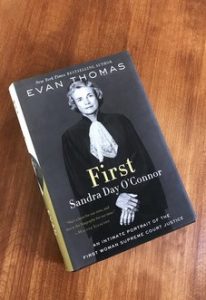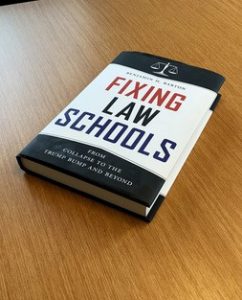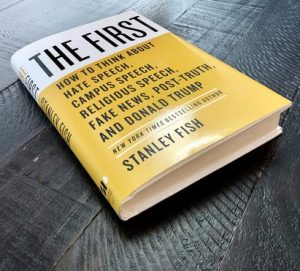The NLJ Bookshelf: What Our Editors are Reading
NLJ staff discuss the books they're reading.
February 27, 2020 at 03:25 PM
7 minute read

The fast-paced life of a lawyer can make personal time seem like an elusive concept, but we all know the joys of making time to sit down with a good book. If you're looking for something new to read, you're in luck. From a look inside the life of Justice Sandra Day O'Connor, the first woman to serve on the U.S. Supreme Court, to a thought-provoking analysis of free speech, our editors and reporters at The National Law Journal share a sneak peek at a few legal works we're currently reading.
"First: Sandra Day O'Connor," by Evan Thomas
 "First: Sandra Day O'Connor," by Evan Thomas.
"First: Sandra Day O'Connor," by Evan Thomas.This intimate biography of Justice Sandra Day O'Connor is full of surprises, many of them unearthed by author Evan Thomas from her papers, correspondence and oral histories, and others from her husband John's diary that he began when she joined the Supreme Court in 1981.
The justice granted Thomas access to all of these sources and allowed her fellow justices and law clerks to be interviewed by Thomas.
But perhaps the biggest surprise after reading this richly readable book may be how quaint and distant O'Connor's tenure, temperament and tenets now seem to be.
It was only 13 years ago that she retired, and only a year ago when she announced she was withdrawing from the public scene because she was in the beginning stage of Alzheimer's disease. But in the poisoned and ideological atmosphere that has enveloped Washington, D.C., the stories of O'Connor's camaraderie and genteel manner with friends and adversaries seems regrettably antiquated.
But that makes the book all the more pleasant and important to read. It is a reminder that rancorous confirmation hearings and vicious rivalries are not the norm. O'Connor was confirmed by a 99-0 Senate vote. And as soon as she joined the court, O'Connor corralled her new colleagues into dining together at the court as often as possible. "Now Clarence, you need to come to lunch," O'Connor told Justice Clarence Thomas. Initially wary, Thomas acquiesced.
The book will take you back to O'Connor's rough childhood at the Lazy B Ranch in Arizona where she learned the "get it done" work ethic. You will learn that O'Connor's well-known dating relationship with Stanford Law School classmate (and future chief justice) William Rehnquist was more than that. Rehnquist actually asked O'Connor to marry him—a proposal he made while clerking at the Supreme Court. She said no, but they remained friends when they began to work together at the court.
O'Connor's role as pivotal justice is well chronicled by the book, but author Thomas does not get lost in the weeds of legalese. From her role in Bush v. Gore to dancing with Justice Lewis Powell at the posh Sulgrave Club, the details of the book illuminate the importance and uniqueness of O'Connor as a justice and as a woman—the first woman on the Supreme Court. –Tony Mauro
"Fixing Law Schools: From Collapse to the Trump Bump and Beyond," by Benjamin H. Barton
 "Fixing Law Schools," by Benjamin H. Barton.
"Fixing Law Schools," by Benjamin H. Barton.The devastating market crash of 2008 took a major toll on every American, even kicking off a rift in the nation's law schools from 2008 to 2018—what some call the "lost decade." The crash impacted law school student applications immensely and even forced some schools to close. Author Benjamin Barton discusses this and more in "Fixing Law Schools: From Collapse to the Trump Bump and Beyond."
Barton covers everything from the "original sin" of law schools teaching law but not teaching students how to be lawyers, to the difficult job market for law school graduates, to how artificial intelligence is beginning to play a role in law. (For example, AI is able to edit and spot errors in documents faster than humans can. JP Morgan replaced 360,000 hours of staff time between lawyers and loan officers through the use of its AI program, Contract Intelligence or COIN, a 2017 Bloomberg story reported.)
Barton shines a light on the flaws of the legal education system and the efforts needed to get it back on track. Among his suggestions for changes: lowering the cost of tuition, giving students the tools they need to succeed, and for schools to be more aggressive and forward-looking by using technology in their teaching to practice law.
"All law schools, from top to bottom, have failed to address the root causes of their challenges," says Barton. "Rather than make the value proposition of law school better by improving the product and lowering the price, law schools of all stripes did little to improve (and many got worse through deep cuts) but much to raise prices."
Barton contends that law school stakeholders—faculty, students, graduates and regulators—should take a closer look at the legal education framework and work together to bolster reform. As the title "From Collapse to the Trump Bump and Beyond" suggests, the Trump Bump has been great for law schools, but time will tell if this will prove to be permanent. Barton demonstrates just how important it is for legal educators to stay on top of student needs. The future of our legal system depends on it. –Victoria Ostrander
"The First: How to Think About Hate Speech, Campus Speech, Religious Speech, Fake News, Post-Truth and Donald Trump," by Stanley Fish
 "The First," by Stanley Fish.
"The First," by Stanley Fish.Do Holocaust deniers deserve a voice? Where is the line between exercising a constitutional right and hate speech? When can we actually speak freely?
In "The First: How to Think About Hate Speech, Campus Speech, Religious Speech, Fake News, Post-Truth, and Donald Trump," author Stanley Fish poses heavy-hitting, thought-provoking questions and draws on a vast collection of ideologies, perspectives and recent and historical legal precedent to craft a well-rounded analysis of the First Amendment's protections of free speech, diving into what is and isn't—or perhaps what should and shouldn't be—protected speech under the First Amendment.
From the role, or lack thereof, of free speech in academia, to why religious speech should be excluded from the First Amendment altogether, Fish presents counterintuitive arguments as he ponders various contradictions and interpretations of free speech.
Beyond examining legal technicalities of the amendment, Fish ponders various interpretations and contradictions of free speech, maneuvering between legal texts and relatable current events to vividly illustrate the ways the constitutional right applies to society today.
Was Kim Davis, the Kentucky county clerk who refused to issue marriage licenses to same-sex couples based on religious beliefs, for example, protected under the First Amendment? What about James Tracy, a tenured professor who, via blog posts and other public venues, said that the Sandy Hook tragedy in Newtown, Connecticut, was staged with the intention to promote the passage of gun control legislation? And was the NFL wrong to supposedly blackball Colin Kaepernick after he spent the 2016 season kneeling during the national anthem to make a political statement?
At the very least, these are all questions worth asking. And while everyone may not agree with Fish's arguments on free speech, it's an unquestionably thought-provoking read for lawyers and non-lawyers alike. –Sarah Tincher
This content has been archived. It is available through our partners, LexisNexis® and Bloomberg Law.
To view this content, please continue to their sites.
Not a Lexis Subscriber?
Subscribe Now
Not a Bloomberg Law Subscriber?
Subscribe Now
NOT FOR REPRINT
© 2025 ALM Global, LLC, All Rights Reserved. Request academic re-use from www.copyright.com. All other uses, submit a request to [email protected]. For more information visit Asset & Logo Licensing.
You Might Like
View All

A Conversation with NLJ Lifetime Achievement Award Winner Jeh Johnson

'As I've Grown Older': John Morgan Looks Back at a Life in Law

Binance's Singapore-Based General Counsel Is Shattering Crypto's 'Bro Ceiling'
4 minute readTrending Stories
- 1Carol-Lisa Phillips to Rise to Broward Chief Judge as Jack Tuter Weighs Next Move
- 2Data Breaches in UK Legal Sector Surge, According to ICO Data
- 3Georgia Law Schools Seeing 24% More Applicants This Year
- 4After Shutting USAID, Trump Eyes Department of Education, CFPB
- 5‘Keep Men Out’: Female Swimmers Sue Ivy Leagues Over Lia Thomas’ Sweep
Who Got The Work
J. Brugh Lower of Gibbons has entered an appearance for industrial equipment supplier Devco Corporation in a pending trademark infringement lawsuit. The suit, accusing the defendant of selling knock-off Graco products, was filed Dec. 18 in New Jersey District Court by Rivkin Radler on behalf of Graco Inc. and Graco Minnesota. The case, assigned to U.S. District Judge Zahid N. Quraishi, is 3:24-cv-11294, Graco Inc. et al v. Devco Corporation.
Who Got The Work
Rebecca Maller-Stein and Kent A. Yalowitz of Arnold & Porter Kaye Scholer have entered their appearances for Hanaco Venture Capital and its executives, Lior Prosor and David Frankel, in a pending securities lawsuit. The action, filed on Dec. 24 in New York Southern District Court by Zell, Aron & Co. on behalf of Goldeneye Advisors, accuses the defendants of negligently and fraudulently managing the plaintiff's $1 million investment. The case, assigned to U.S. District Judge Vernon S. Broderick, is 1:24-cv-09918, Goldeneye Advisors, LLC v. Hanaco Venture Capital, Ltd. et al.
Who Got The Work
Attorneys from A&O Shearman has stepped in as defense counsel for Toronto-Dominion Bank and other defendants in a pending securities class action. The suit, filed Dec. 11 in New York Southern District Court by Bleichmar Fonti & Auld, accuses the defendants of concealing the bank's 'pervasive' deficiencies in regards to its compliance with the Bank Secrecy Act and the quality of its anti-money laundering controls. The case, assigned to U.S. District Judge Arun Subramanian, is 1:24-cv-09445, Gonzalez v. The Toronto-Dominion Bank et al.
Who Got The Work
Crown Castle International, a Pennsylvania company providing shared communications infrastructure, has turned to Luke D. Wolf of Gordon Rees Scully Mansukhani to fend off a pending breach-of-contract lawsuit. The court action, filed Nov. 25 in Michigan Eastern District Court by Hooper Hathaway PC on behalf of The Town Residences LLC, accuses Crown Castle of failing to transfer approximately $30,000 in utility payments from T-Mobile in breach of a roof-top lease and assignment agreement. The case, assigned to U.S. District Judge Susan K. Declercq, is 2:24-cv-13131, The Town Residences LLC v. T-Mobile US, Inc. et al.
Who Got The Work
Wilfred P. Coronato and Daniel M. Schwartz of McCarter & English have stepped in as defense counsel to Electrolux Home Products Inc. in a pending product liability lawsuit. The court action, filed Nov. 26 in New York Eastern District Court by Poulos Lopiccolo PC and Nagel Rice LLP on behalf of David Stern, alleges that the defendant's refrigerators’ drawers and shelving repeatedly break and fall apart within months after purchase. The case, assigned to U.S. District Judge Joan M. Azrack, is 2:24-cv-08204, Stern v. Electrolux Home Products, Inc.
Featured Firms
Law Offices of Gary Martin Hays & Associates, P.C.
(470) 294-1674
Law Offices of Mark E. Salomone
(857) 444-6468
Smith & Hassler
(713) 739-1250








